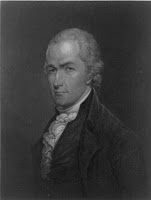
Alexander Hamilton: not a Jefferson-Jackson Democrat
One idea that's become a commonplace in American history that has bugged me for a long time is the idea that the "Hamiltonian" notion of government won out over time against the "Jeffersonian" form. In this framework, even the New Deal is presented as "Hamiltonian": the New Deal, a signature accomplishment of the Party founded by Thomas Jefferson.
Historian William Hogeland challenges some more recent hagiography about that old reactionary monarchist Alexander Hamilton in Inventing Alexander Hamilton: The troubling embrace of the founder of American finance Boston Review Nov/Dec 2007. He discusses the "Newburgh Crisis", an effort by Hamilton and his allies to get up a military coup in the 1780s:
Certain aspects of the Newburgh Crisis are worth arguing about. (How willing were the Morrises and Hamilton to support an actual coup? Were they gambling on avoiding one at the last minute? How would they have controlled events if the Gates mutiny had succeeded?) What hasn’t been at issue in any serious way since E.J. Ferguson and Richard Kohn wrote about these events in the 1960s and ’70s is Hamilton’s eagerness to avoid applying the rule of law to his view of what was best for the country. He was developing an urgent desire for authoritarian government, whose well-funded debt, supported by nationally enforced taxes, would increase the wealth of the richest class of Americans and yoke that class to national purpose. He bet everything, including his reputation as a loyal patriot, on forging a common project between the military and the investor classes to override the will of elected governments. [my emphasis]Jefferson's objections to Hamilton's financial schemes during the Washington administration was not based on some agrarian utopianism. Jefferson objected to the fact that Hamilton wanted to basically award swindlers who had accumulated government bonds from small investors. He also objected to Hamilton's cynical notion of governance. Although Jefferson thought Hamilton himself was personally honest, Hamilton thought that American democracy could only function on the basis of bribing members of Congress.
Hogeland in the quote above touches on the key problem in the notion that "Hamiltonian" government won out over "Jeffersonian". To justify such an argument, one basically has to focus on broad structural issues and ignore the concrete political content of those competing notions. It is Jefferson's notion of broad-based democracy that won out over time, certainly in the perceptions of the public about what democracy means. Unfortunately, we still have our Hamiltonians around. And our system of campaign financing, which Jerry Brown even back in 1992 was calling a system of "bribery", actually does represent a kind of triumph of the dark side of "Hamiltonian" governance.
Hogeland also discusses the issue of the Revolutionary War debt, which is another incident that is often grossly distorted by Hamilton's apologists.
One complaint about Hogeland's piece. He doesn't communicate that the "liberal" Hamiltonian Project that he mentions has actually been an important player in the anti-Social-Security "entitlement reform" scam.
I would also add that Hamilton as the first Secretary of the Treasury under the current Constitution was a key player in establishing the basic American finance system, although the Jefferson administration and Jefferson's Treasury Secretary Albert Gallatin should actually be given more credit.
Hamilton's greatest contribution to political theory, and a positive one, was his advocacy of the proposed Constitution, as preserved in his essays in The Federalist Papers. It may be his greatest public contribution overall. In that political fight, he was one the same side as serious democrats like Jefferson and James Madison against the conservatives and reactionaries who opposed the Constitution.
That's another of my historical pet peeves, the still-influential notion popularized by "Progressive" historian Charles Beard, who became a rabid isolationist and FDR-hater, that it was conservatives who supported the Constitution and the liberals/progressive/left who opposed it. Not the case. But I'll get into that some other time.
Tags: alexander hamilton, thomas jefferson, william hogeland
1 comment:
i very much enjoy your own writing type, very remarkable.
don't give up and also keep penning mainly because it simply very well worth to look through it.
impatient to browse through a lot more of your web content, good bye :)
Post a Comment